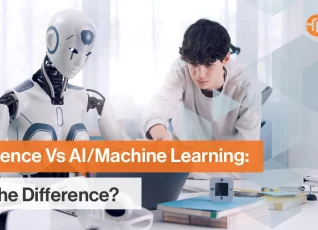Technology is an integral part of economic and societal growth. AI is at the forefront as an enabler of digital transformation. From Machine Learning (ML) and smart robots to self-driving vehicles, it has become a part of our everyday lives. As a trending debate topic, technical experts often come across questions about the pros and cons of Artificial Intelligence.
Is Artificial Intelligence a threat? Some perceive it as a disaster, while others believe that the limitations of Artificial Intelligence exceed its positives. Nothing could be further from the truth, considering the increasing dependence on AI and its application, especially in business.
So, why AI is good? Here’s one of the key reasons. It leverages ML and Natural Language Processing (NLP) that enable machines to sense, understand, act, as well as learn. Consider the well-known examples of Siri, Alexa, and Google Assistant. These digital voice assistants utilize ML and NLP to operate effectively and improve performance over time. They offer the convenience of daily life by carrying out standard, personal tasks with advanced efficiencies. Whether we have recommendation engines to help us choose specific products, Google Map analyzing options for the best routes, or AI answering abstract questions, one thing is clear. AI is paving the way for greater efficiency and productivity.
Now, let’s have a look at the benefits of Artificial Intelligence.
Reduces Human Error
As humans, it is easy to make mistakes from time to time especially if we are exhausted, stressed out, or aging, and these factors directly reflect on our decision-making. For instance, a doctor or pilot operating in time and mission-critical scenarios may make fatal mistakes that lead to tragedies.
If we program AI computers properly, they are error-free. These computers make decisions based on previous data records they collect by using a specific set of algorithms. These minimize errors and increase the chances of reaching accuracy with remarkable precision. You can solve problems involving complex calculations without any scope of error. Also, artificial thinkers do not display human emotions, which means they reach logical conclusions with zero distractions. This makes them more efficient as they can make rational decisions in minimal time.
This is useful in industries that must ensure a high level of correctness in their daily operations. Eliminating costly errors leads to higher output and saves money in the long run. Let’s look at two common examples. In the customer service sector, companies use digital assistants to interact with users efficiently. When it comes to weather forecasting, AI reduces human error and increases accuracy. Let’s not forget the forex and stock markets where applying AI has become a common practice. AI-driven machines work with scores of data points in real-time to identify relevant patterns and facilitate profitable trades.
Zero Slowdown
Machines do not get tired even if they function for continuous hours. This is a major benefit over humans who require rest to maintain efficiency. Let’s look at some statistics. An average person can work at least 4-5 hours a day excluding breaks. We have to take some time off for work or refresh ourselves every once in a while. Then, we prepare ourselves for a new day of work while keeping our personal and professional lives separate. With AI, we can make machines work 24 x 7 and unlike us humans, they do not even get bored.
What happens when AI augments human capabilities? Its computing power bypasses humans in both speed and quality of work. This is because AI is stronger in terms of modeling, forecasting, and combining massive data sets. Let’s look at some examples. Artificial Intelligence reduces the time of evaluating insurance claims. Instead of having an insurer take days to reach a decision, an AI system can manage within minutes. Moreover, the oil and gas industry uses AI applications to digitize records, tackle exploration or production challenges, conduct precision drilling, improve productivity with predictive maintenance, etc. Not to mention how helpline centers leverage AI to manage bulk queries and issues.
Lessens Routine Chores
We perform repetitive tasks in our routine, such as making calls, sending emails, verifying documents for errors, etc. These can be monotonous and time-consuming, so why not let AI handle them? We can productively automate such tasks and free ourselves for more creative projects or assignments. There are lots of options to explore. For example, Apple, and Google offer free access to assistants that can take care of basic tasks for busy people.
Some AI assistants can even interpret the context of a request and synchronize information across various devices, including smartphones, cars, TVs, refrigerators, etc. Users can easily control them from any location inside or outside the house. Look up AI-powered smartphones that reduce energy and water consumption, and improve our overall lifestyles.
Let’s look at some applications. With just a single tap, Siri listens to us and performs a task, and GPS helps us reach an out-of-town job interview. When we use our mobile phones, AI predicts the words we are going to type, and even uses autocorrect if we make an error. What about banks and financial services that review customer documents to approve loans? More often than not, this can be a repetitive task for professionals who would rather convince customers to buy bank products or apply for credit cards. Using cognitive automation, banks can speed up document verification processes to save time for everyone.
Improves Customer Experiences
Many companies leverage digital assistants to interact with users to eliminate the need for hiring, onboarding, and training human resources. eCommerce stores also use digital assistants on their websites to guide users and help them with the product selection process. Let’s consider an example.
Not long ago, forecasting website traffic levels or customer buying preferences were based on experience. Business analysts learned from past experiences to make judgments. Although this still happens, enterprises are most likely to factor AI into their calculations. Today, most businesses have dedicated customer support teams for answering customer queries, resolving complaints, or clarifying doubts. Using AI, organizations can set up chatbots or voice bots to manage customer questions, and these are common on mobile applications as well as websites.
Furthermore, Artificial Intelligence decreases costs, improves agility, promotes productivity, minimizes failure, and enhances customer satisfaction. Consider how the ability to predict customer preferences and behavior represents a competitive edge. AI algorithms can predict what a specific customer is most likely to purchase, as Amazon has shown us. The giant uses Machine Learning to predict consumer behavior and this is one of the reasons behind its incredible success today.
This is not all. AI maintains top quality standards, making it possible to reduce waste and boost customer happiness. Related Innovations deliver more value with less input, allowing businesses to achieve sustainable growth.
Medical Applications
Artificial Intelligence powers creativity and innovation in the medical field which is one of the best things during these difficult times. This enables doctors and nurses to resolve complex and possibly life-threatening problems. Let’s look at a scenario. Doctors review the health risks of patients with machine intelligence. Applications educate machines about the side effects of different medicines which is a good practice in prescribing medicines. Artificial surgery simulators also use applications for tasks like detecting and tracking neurological diseases and stimulating brain functions. This is useful in practical situations such as radiosurgery.
Other than identifying potential neurological disorders and cancer risk, what is the impact of Artificial Intelligence on society? Let’s approach it in the context of the COVID-19 pandemic.
AI-based technologies allow healthcare specialists to share critical data about the pandemic. This includes information related to clinical trials, insights into how the virus is developing, etc. Now, it is possible to share real-time details with medical staff, research labs, and scientists across the globe. Healthcare practitioners from virtually anywhere in the world can access databases and have all the latest insights within seconds. AI solutions also contribute to vaccine development by identifying molecules, compiling data about related diseases like SARS and test subjects, etc.








